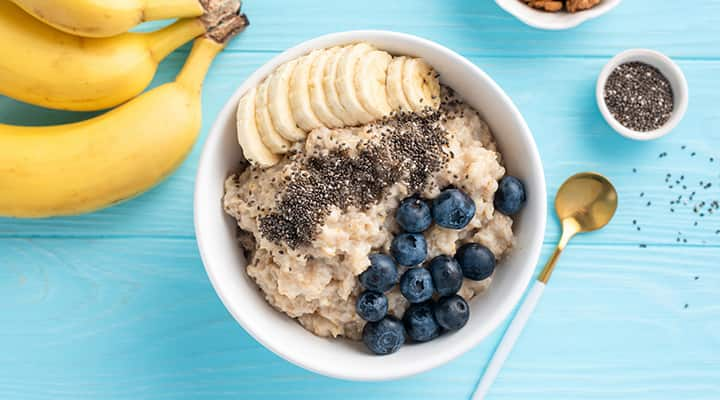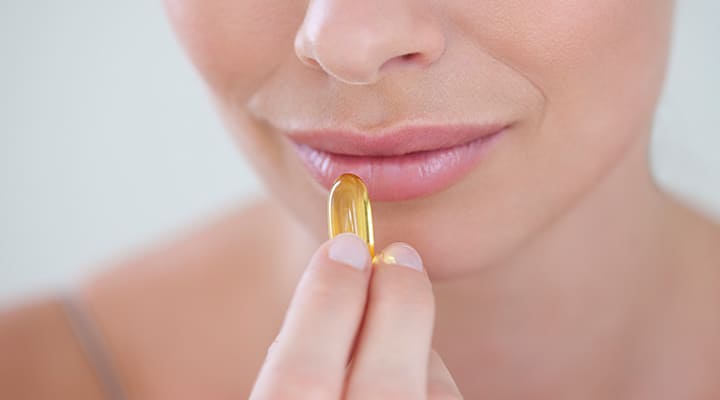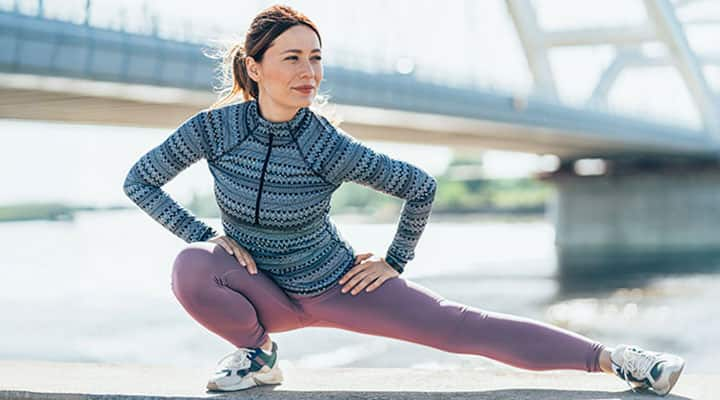
Vegan Omega-3 Supplements: Best Sources
Published: December 2021
You’ve probably heard that omega-3s are important for whole-body health. But do you know why? Long-chain omega-3 fatty acids are one of the two major types of polyunsaturated fats (PUFAS). They’re essential for energy production, cellular function, and keeping your heart, brain, kidneys, eyes, and skin healthy.
Unfortunately, if you follow a vegan or vegetarian diets or fish and seafood aren’t your go-to choices, your body may experience some nutrient deficiencies. The good news is that you can adjust your meals to include more plant-based omega-3 sources and complement your food choices with vegan DHA products.
So, where do you get vegan omega-3s—and should you take vegan omega-3 supplements? Here’s everything you need to know.
Do I need omega-3 as a vegan?

There are three main types of omega-3s: docosahexaenoic acid (DHA), eicosapentaenoic acid (EPA), and alpha-linoleic acid (ALA). Of these fats, ALA is essential, which means your body can’t produce it, so you must get it from your diet. Fatty fish and seafood are rich sources for EPA and DHA, often called fish oil. On the other hand, most plant sources are rich in ALA, which is why they are the go-to source of omega-3s for vegans.
Your body can make EPA and DHA from alpha-linoleic acid. Still, only about five percent of ALA is efficiently converted to these other fatty acids, which means you may not be getting the heart health benefits EPA and DHA offer. That’s why having a strategic vegan nutritional plan can fill in any gaps and support healthy levels of omega-3s without compromising your food choices.
If you don’t want to add omega-3s to your routine, but you’re still looking for plant-based nutritional support, you can look for plant-based multivitamins or vegan vitamin D.
Vegan sources of omega 3: foods vs. supplements

Your primary source of omega 3s should be from the foods you eat. A good rule of thumb for non-vegetarians is to eat a serving of a fatty fish like salmon once a week. Vegans, on the other hand, should make an effort to add more ALA-rich, plant-based sources to their meals. Here are some good ones to add to your grocery shopping list.
5 vegan foods high in omega 3
Brussels sprouts and leafy greens—
Adding cruciferous vegetables like brussels sprouts, broccoli, broccolini, and leafy vegetables like spinach can help you get more ALA, helping your body produce EPA and DHA. Add them to stews, or roast or sauté them to make a nutritious side dish.Walnuts—
Have a handful of walnuts; they are an excellent source of ALA, and they also offer brain health benefits. And a 2013 study found that walnut extract and omega-3 fatty acids encourage healthy cellular function over time. Enjoy them as a snack or add them to salads, pasta dishes, or overnight oats.Chia seeds—
Loaded with polyunsaturated fats (ALA accounts for about 60 percent of all fatty acids), chia seeds are a fun and easy way to ensure you’re getting the health-promoting benefits of omega-3s. They’re also a rich source of fiber, protein, and other nutrients like calcium, iron and magnesium. Sprinkle some chia seeds on your protein smoothie, on your PB&J toast, or make chia seed pudding.Algae and algal oil—
The high content of EPA and DHA in algae make them one of the few vegan sources of these fatty acids. Have them in salads, or make vegan sushi burritos.Flaxseeds—
This superfood is rich in omega-3s, and about 55 percent of total fatty acids are alpha-linoleic acid. Plus, studies show flaxseeds support heart health and offer other health-promoting benefits. Add flaxseeds to your smoothies, add them to a batter of multigrain muffins, or sprinkle them on your cereal.
Explore Our Best General Health & Wellness Supplements
How to choose your vegan omega-3 supplements

Before you stock up on omega-3 supplements, check your omega-3 levels by taking a blood test that includes a complete fatty acid profile, which will let you know if you’re getting sufficient amounts of omega-3s.
Once you know your omega-3 levels, speak with your healthcare provider to determine what omega-3 supplements are best for you, and choose high-quality products that fit your individual needs.
In general, finding the right supplement comes down to whether you’re getting the Recommended Daily Allowances (RDAs) of nutrients from your meals, but keep in mind that RDAs are the bare minimum your body needs to avoid deficiencies. If you’re striving for optimal health, then choose a supplement plan that complements your nutritional needs and supports your health goals for maximum results.
Choosing the right omega-3 supplement to add to your wellness journey means selecting high-quality products that have been tested for purity and potency and have health benefits supported by clinical research—always look for transparency when you read the ingredients in the label.
Best vegan omega-3 supplements
Now that you know how to choose the right supplements for you, how do you know what the best vegan omega-3 is? Look for algae oil and algal supplements to make sure your body gets the heart health benefits of omega-3s, which have been shown to support DHA levels significantly.
Can you get enough omega-3 without fish oil?
Even after increasing your ALA intake in your meals, your body may still miss out on omega-3’s health-promoting benefits. Most studies show that vegan diets offer minimal amounts of EPA and DHA. And the low conversion efficiency of ALA to EPA and DHA makes it challenging to maintain healthy omega-3 levels.
That’s why supplementing with vegan omega-3 supplements can be a great way to complement your smart lifestyle choices—so you can keep your omega-3 levels right where you want them.
References
- Burdge, G C. “Metabolism of Alpha-Linoleic Acid in Humans.” Prostaglandis Leukot Essent Fatty Acid, September 2006, https://pubmed.ncbi.nlm.nih.gov/16828546/
- Burns-Whitemore, Bonny et al. “Alpha-Linolenic and Linoleic Fatty Acids in the Vegan Diet: Do They Require Dietary Reference Intake/Adequate Intake Special Consideration?” Nutrients, October 2019, https://www.ncbi.nlm.nih.gov/labs/pmc/articles/PMC6835948/
- Carey, N Amanda, et al. “ The Ability of Walnut Extract and Fatty Acids to Protect Against the Deleterious Effects of Oxidative Stress and Inflammation in Hippocampal Cells.” Nutr Neurosci., January 2013, https://pubmed.ncbi.nlm.nih.gov/23321679/
- Craddock, J C et al. “Algal supplementation of vegetarian eating patterns improves plasma and serum docosahexaenoic acid concentrations and omega-3 indices: a systematic literature review.” J Hum Nutr Diet, December 2017, https://pubmed.ncbi.nlm.nih.gov/28417511/
- Kajla, Priyanka et al. “Flaxseed—A Potential Functional Food Source.” J Food Sci Technol.,April 2015, https://www.ncbi.nlm.nih.gov/labs/pmc/articles/PMC4375225/
- Laing, Brennan Bobbi, et al. “Effects of an Omega-3 and Vitamin D Supplement on Fatty Acid and Vitamin D Serum Levels in Double-Blinded, Randomized, Controlled Trials in Healthy and Crohn’s Disease Populations.” Nutrients,April 2020,https://www.ncbi.nlm.nih.gov/labs/pmc/articles/PMC7230517/
- Lane, Katie E. et al. “Bioavailability and conversion of plant based sources of omega-3 fatty acids - a scoping review to update supplementation options for vegetarians and vegans.” Crit Rev Food Sci Nutr., February 2021, https://pubmed.ncbi.nlm.nih.gov/33576691/
- Plourde, Melanie et al. “Extremely Limited Synthesis of Long Chain Polyunsaturates in Adults: Implications for Their Dietary Essentiality and Use as Supplements.” Appl Phsyiol Nutr Metab.,August 2007, https://pubmed.ncbi.nlm.nih.gov/17622276/
- Ros, Emilio et al. “Beneficial Effects of Walnut Consumption on Human Health: Role of Micronutrients.” Curr Opin Clin Nutr Metab Care.,November 2018, https://pubmed.ncbi.nlm.nih.gov/30199393/
- Russo, Luigi Gian. “Dietary n-6 and n-3 Polyunsaturated Fatty Acids: From Biochemistry to Clinical Implications in Cardiovascular Prevention.” Biochem Pharmacol., March 2009, https://pubmed.ncbi.nlm.nih.gov/19022225/
- Salehi, Bahare, et al. “Insights on the Use of Alpha Lipoic Acid for Therapeutic Purposes.” Biomolecules., August 2019, https://www.ncbi.nlm.nih.gov/labs/pmc/articles/PMC6723188/
- Welch, Alisa, et al. “Dietary Intake and Status of n-3 Polyunsaturated Fatty Acids in a Population of Fish-Eating and Non-Fish-Eating Meat-Eaters, Vegetarians, and Vegans and the Product-Precursor Ratio [Corrected] of Alpha-Linoleic Acid to Long-Chain n-3 Polyunsaturated Fatty Acids: Results From the EPIC-Norfolk Cohort.” Am J Clin Nutr.,November 2010, https://pubmed.ncbi.nlm.nih.gov/20861171/
- “Essential Fatty Acids.” Data on file.
- “Omega-3 Fatty Acids.” National Institute of Health Fact Sheet for Health Professionals, https://ods.od.nih.gov/factsheets/Omega3FattyAcids-HealthProfessional/
- “Omega-3 Supplements: In Depth.” National Center for Complementary and Integrative Health, https://www.nccih.nih.gov/health/omega3-supplements-in-depth
- “Vegetarian Nutrition.” USDA National Agricultural Library, https://www.nal.usda.gov/legacy/fnic/vegetarian-nutrition
Like what you read?
Please subscribe to get email updates on this blog.




